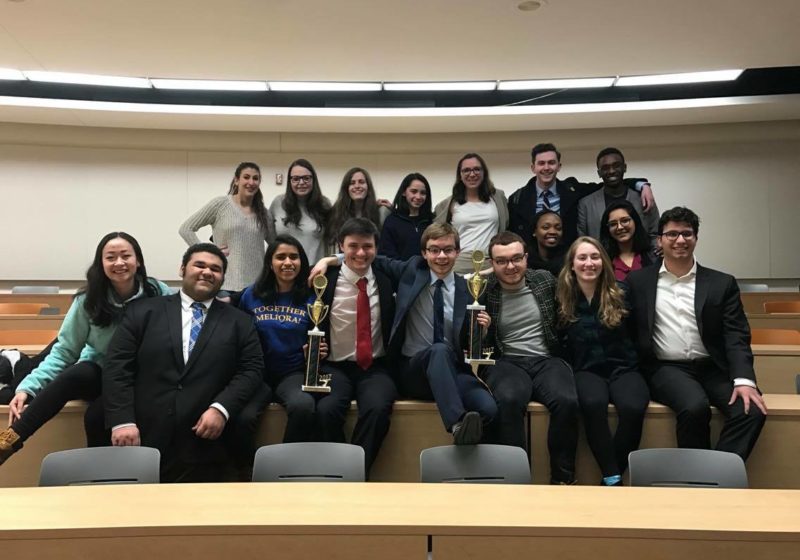It’s a civil case, and the stakes are high. A magazine is being sued by a recently fired writer, whose claims of age discrimination could have the company on the hook for liability and damages.
The catch, of course, is that it’s all made up.
But for the members of UR Mock Trial, who advanced past the regional round at Buffalo State last weekend, the details of the case have governed their lives since last August, when the American Mock Trial Association (AMTA), which oversees all collegiate mock trial, released the case file.
Both the Rochester A and B teams will compete at the Opening Round Championship Series (ORCS) in Lancaster, Pa., from Mar. 17 to 19.
Should they finish in the top six, they’ll be invited to nationals, held at UCLA.
At Buffalo State, freshman Jonathan Rhodes, junior Zachary Marshall, and sophomore Deisy Abarca Espíritu were all individually recognized for their work at the tournament.
For Abarca Espíritu, who “stumbled upon” mock trial after never competing in high school and now captains the B team, her team’s success was the culmination of months of hard work.
“We showed up with really high expectations,” she said, proudly noting her team’s 7–1 record over the four-trial weekend.
(At each tournament, there are “judges,” sometimes actual judges, other times lawyers and professors, who alternately preside over the case or score each team based on presentation, strength of argument, and more; for this competition, there were two ballots per trial).
Squaring off against St. Bonaventure University, Syracuse University, Columbia University, and University of Buffalo, the B team received one of the seven bids given out among the thirty teams that competed.
Abarca Espíritu, like many of those in Mock Trial, has no interest in a legal career (she majors in Biology and Economics), but was drawn to the team by a desire to improve her ability to clearly and concisely express her opinion. Beyond that, she’s found a close group of friends.
“All my housemates are in Mock Trial,” she said. They’re united by the intellectual side of the group, “but of course, we like to win.”
For Matt Hoffner, a sophomore on the B team, testifying in front of the competing teams and the judge used to be nerve-wracking, but it’s now become almost relaxing.
It’s “much more than half the battle,” he said, when it comes to finding success on the stand.
The other part, Hoffner said, is performance, speaking with “vigor and fervor.”
“You’re playing a character,” he said, “and performance is a huge aspect.”
“Mock trial’s not about being right, it’s about looking good in a suit,” he joked.
Rochelle Sun, a junior who dreams of working in civil rights litigation, agrees in principle, at least; she noted that she’d been docked points for being overly aggressive in her cross-examination.
(Sun notes that it seems to be women who’re most often castigated for this, something she attributes to cultural attitudes about women speaking forcefully; she also recalled instances when other women on the team lost points for poorly applied nail polish).
Sun enjoys Mock Trial because it’s helped her learn “how to support [her] own arguments,” but she’s motivated to choose law as a profession by a desire to help others—she sees public defense in her future. For now, she serves as an A team attorney for her “insane, crazy cult-like organization.”
Finishing up his fourth year in Mock Trial, Jason Altabet, a senior and president of the club, has seen the organization improve every year.
“We were far weaker four years ago,” he said, with about 30 members broken up into three teams. Now, they’re pushing 50, with four full teams.
Though his time in Mock Trial is coming to a close, Altabet is still invested in the future of the organization—he’s intrigued by the possibility of competing at Nationals, but he sees this year as another chance to add to Mock Trial’s ranks.
When it comes to advertising, Altabet says this: “If you ever see someone walking around campus mumbling ‘Your Honor’ with a wacky accent, you probably just passed a member of the Mock Trial team.”


